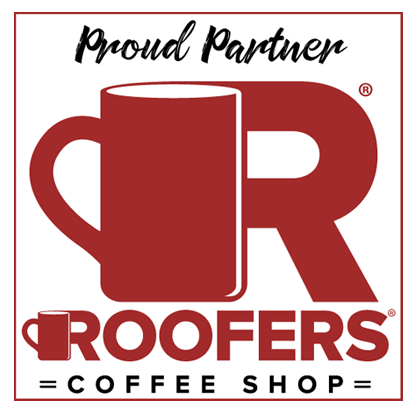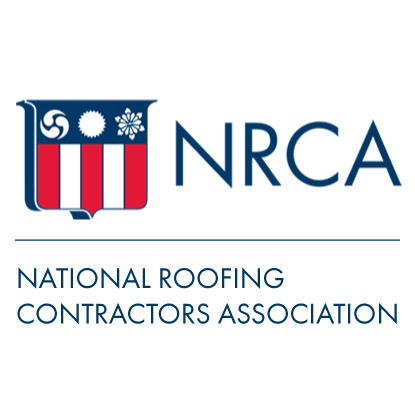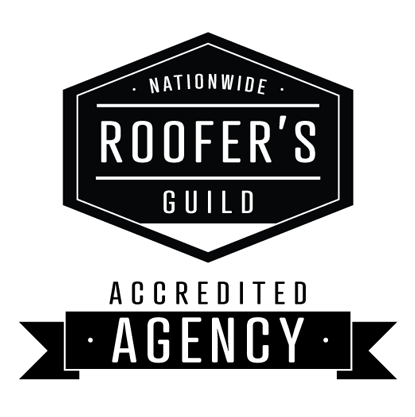Hey, I’m Nolen Walker, the founder of Roofing Webmasters. I’ve helped 1,000+ companies use local SEO for roofers to rank on Google and Google Maps over the past 14+ years.
I even created local SEO software, DataPins, to increase my clients’ E-E-A-T signaling, resulting in higher rankings and conversions.
I’ve crafted the ultimate Local SEO guide for roofing companies based on my decades-plus experience.
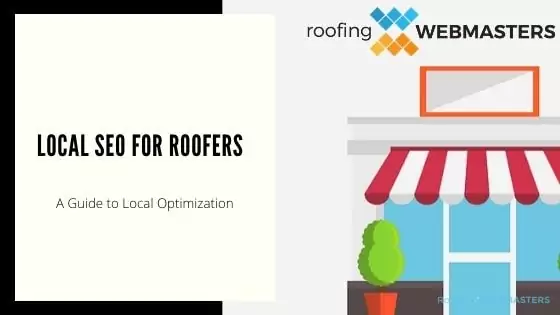
Defining “Local” SEO for Roofing Companies
Local SEO for roofing companies is the process of optimizing a roofing website and Google Business Profile for one or more service locations. Typically, the practice focuses on Google Maps rankings via Google’s Local Map 3-Pack.
However, Local SEO for roofers also encompasses on-site city pages (a.k.a. local landing pages) and business citations on directories like Yelp, Angi, HomeAdvisor, and more.
Ranking within the top 3 locally is crucial to a roofing company’s success, as these search engine results attract 75% of all clicks.
Key Takeaway
Ranking within Google’s Map 3-pack requires an optimized Google Business Profile and a locally relevant website showcasing E-E-A-T and social proof within your target service areas.
Local SEO Ranking Factors for 2025
Ranking factors tell Google where to rank your website on local searches.
However, Google Maps and traditional Google search have separate algorithms with different factors.
While some of these factors overlap, they are not identical.
Google Maps Ranking Factors
Google Maps and (Google Map 3-Pack) have three primary ranking factors which are:
- Distance
- Relevance
- Prominence
Roofing companies can influence these ranking factors through the following techniques:
- Address: Moving to a business address near the center of your target city
- Reviews: Accumulating consistent customer reviews on your Google Business Profile
- Website: Connecting an SEO-optimized website to your Google Business Profile
Google Search Ranking Factors
Traditional organic search works from a separate algorithm but still factors in location for local queries.
For example, when a user searches for “roofers near Baltimore,” Google will show three types of results:
- Directory lists of roofing companies in Baltimore (i.e., Yelp, Better Business Bureau, Angi’)
- Official websites of roofing companies with Baltimore addresses
- Location pages from roofing company websites close to Baltimore (i.e., Rosedale, MD)
While traditional organic results consider hundreds of ranking factors, some of the most influential include:
- Domain Authority (quality and amount of backlinks)
- On-Page SEO (Use of keywords like “Baltimore roofer” and “Baltimore roofing company”)
- Check-ins (Jobsite check-ins or “pins” of verified roofing work in Baltimore)
Remember that these are only three of hundreds of ranking factors, many of which change regularly with each Google algorithm update.
Local SEO Elements for Roofers
When a roofing company onboards with my company, we establish a set of foundation local SEO elements to maximize their visibility on Google.
Check out these elements below:
Google Business Profile
Only businesses with a registered Google Business Profile (formerly Google My Business listing) are eligible to rank within Google Maps and the Google Map 3-Pack.
So what I’m telling you is that a Google Business Profile is MANDATORY for Local SEO. It’s not an option.
Now, there are additional measures you can take (and that we take as an agency) to enhance your GBP listing. However, claiming and verifying your business on Google is the BARE MINIMUM.
Examples of additional Google Business Profile optimization include unique photos, up-to-date information, and Google Posts.
The most important task is inserting your website URL within your profile listing, as it will influence the ranking of the listing on the local map pack.
Pins / Jobsite Check-ins
Most roofers work in multiple cities near their primary business address, which is challenging for SEO.
I solved this problem by developing my software, DataPins, which combines job site check-ins with consolidated E-E-A-T signals like mini-maps, schema markup, geo-coordinates, original photos, and taggable job captions.
Pins are now an essential local SEO element for all my clients and should be for all roofing companies.
NAP Citations
NAP stands for name, address, and phone number. While NAP consistency’s influence is overblown, the presence of citations remains a vital part of local optimization.
Google and other search engines can validate your business by scanning for citations across the web.
The most impactful roofing company citations come from niche directories or major platforms like Yelp, Facebook, and HomeAdvisor.
Once again, ensure your website URL links to each listing as they build link equity for your website and help SEO.
Reviews
The numbers don’t lie; reviews make up 16% of all the ranking signals for local searches. As a roofing company, you must generate consistent reviews from your customers.
All of my clients receive DataPins, which comes with review request automation through SMS and email.
Still, I also encourage my clients to ask for reviews In-person IN ADDITION TO the automated request.
The combination of BOTH tasks has shown to increase review request reposnses by 147%.
You can check out our roofing reviews study to learn more.
Local Keyword Research for Roofing Contractors
Keyword research for local roofing companies is much different than “traditional keyword research.”
Popular keyword research tools like SEMRush, Ahrefs, and Moz are great for measuring the national search volume of a term or phrase but are less accurate at detecting local volume.
One of the problems is that many of the queries local consumers use to find roofing companies are not even registered as keywords on the aforementioned tools or even Google Search Console.
A study found that nearly half of all Google clicks come from “hidden terms,” meaning many of your local visitors search for terms that won’t register as a query within Google Search Console.
This discrepancy often leads to roofers failing to target the best keyword opportunities.
As a long-time roofing SEO agency owner, I’m going to teach you exactly how to research local keywords.
Longtail Keywords
The best way to start building your keyword list is by identifying long-tail niche keywords.
A long-tail keyword is three or more words and is highly specific. A moderate long-tail keyword example for roofers would be modified bitumen roof installation.
This keyword registers an 80 search volume nationally, making it a great local option.
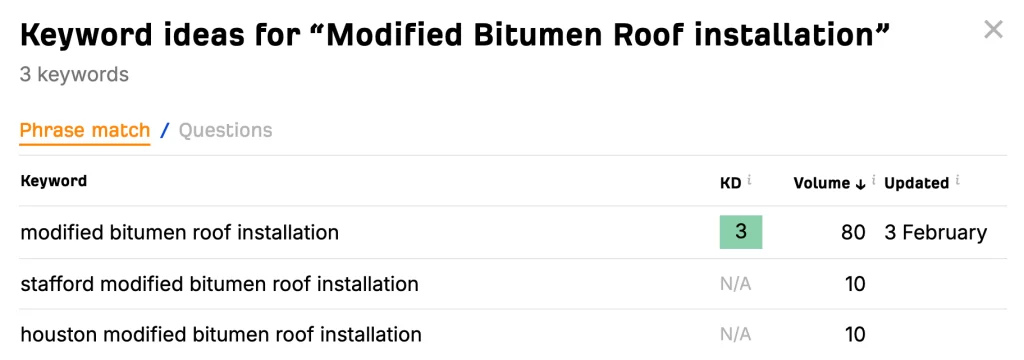
Digging Deeper to “Hidden Terms”
Starting with long-tail keywords is a great foundation, but any term or phrase with a registered search volume garners competition.
Even long-tail keywords with low difficulty are already being targeted by multiple competitors in your area.
That’s where hidden terms come into play, which is a secret local SEO weapon for roofing companies.
Although hidden terms are technically long-tail keywords, they don’t register in Google Search Console or 3rd party keyword tools.
Let me give you an example: carlisle epdm roof repair tega cay
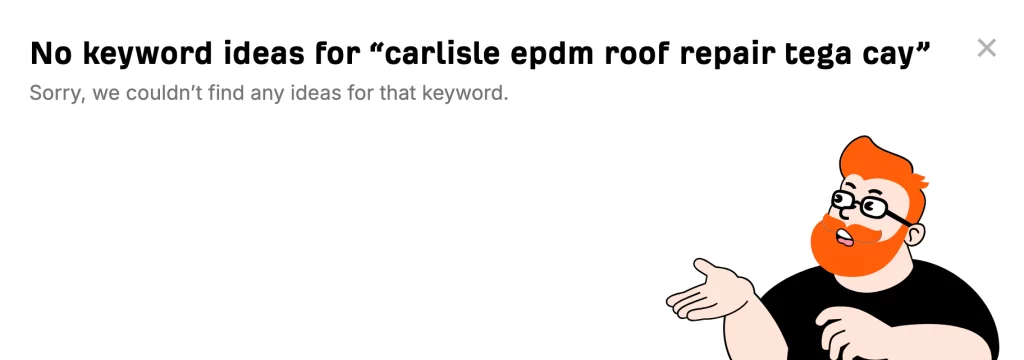
While “epdm roof repair” certainly registers volume, adding the brand “Carslisle” and the city “Tega Cay” turns this query into a hidden term.
You might wonder if consumers actually search for terms like this. It happens all the time.
Nearly half of ALL CLICKS come from terms like these. For local roofers, the percentage is even higher.
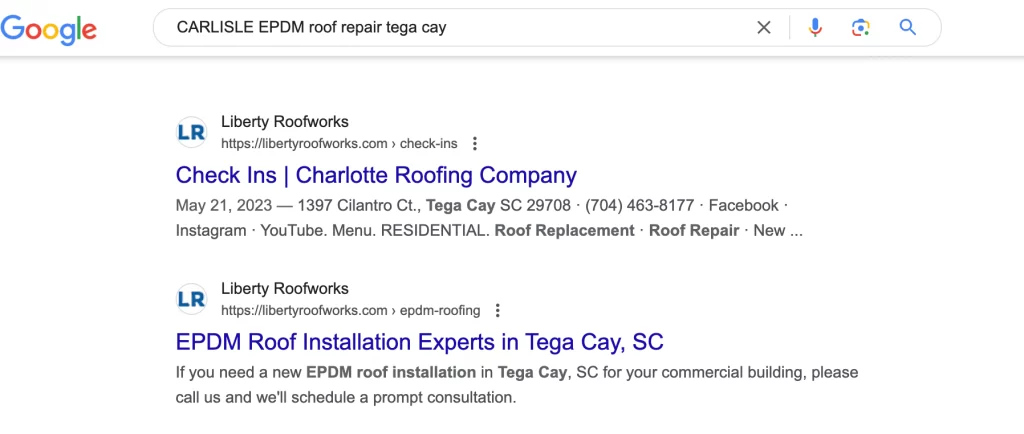
Voice Search Keywords
Recent data shows that a 3rd of Americans report using the voice search function at least once a month. And that number is set to hit 5 billion people worldwide this year.
The point is that voice searching is on the rise, and it impacts how local roofing companies appear in search.
Traditional searches are terse and omit certain articles and conjunctions (i.e., roof replacement Tampa instead of roof replacement in Tampa). Conversely, voice searches are longer and more conversational.
In addition to longtail local keywords, start targeting longer conversational key phrases. For example, a person conducting a voice search may say something like, “how much does it cost to repair a roof leak.”
While you want to target this voice query’s intent, you don’t want to target the EXACT phrase.
I’ve seen roofers OVER-OPTIMIZE their websites by creating a seprate blog post for each invidual question.
This is how you get penalized by Google’s Helpful Content Update.
The right way to target these phrases is by creating a content asset like “The Ultimate Guide to Roof Leak Repairs in Pflugerville, TX”
The asset should feature specific data about leak repair costs in your precise service area and other helpful information.
A comprehensive guide like this will always outrank a spammy article that answers one question.
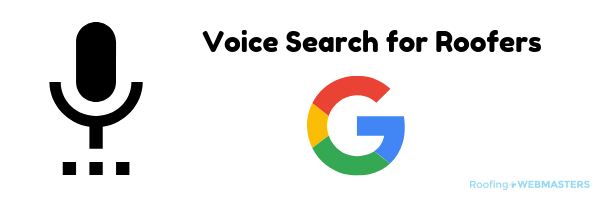
Local Link Building for Roofers
For many contractors, link building for roofers is a mystery. Like keyword research, local link building is far different from national link building.
On a national scale, websites mainly benefit by acquiring links from high-authority websites. On a local level, link building is all about relevance.
It doesn’t matter if the website linking to you has a 10 Domain Authority or a 60 Domain Authority as long as the page and content are relevant to your business.
There are two primary ways to measure relevance:
- Local Relevance: A third-party website that focuses on your primary city (i.e., local newspaper, little league team)
- Industry Relevance: a 3rd party website that focuses on your industry (roofing)
You’ll want to start by focusing on high-relevance links like your city and industry. However, there are degrees of relevance.
For example, a construction website is still relevant enough to serve as a valuable link.
The key is finding these link opportunities for your website.
Here are some tips for building local backlinks:
Business Networking
Networking can earn your business natural links from nearby businesses. For example, realtors in your service area may need to recommend a roofing company on their website.
There’s no reason why that company should not be yours, which can help you with local SEO and business referrals.
Link Outreach
Before you start cold emailing and calling businesses in your area, take a look at their website. Determine which page a link to your website would make the most sense, and use that info in your proposal.
Only build links that help website users. Unnatural links can get your website penalized.
Chambers of Commerce
This is an easy one. Your local chamber of commerce is clamoring to list your business if it isn’t already.
Make sure you register with the chambers of commerce in all the areas you service and that they include a link to your site on theirs.
Local Sponsorships
Sponsoring events like Little League games and charity events is a great way to get your name out there. It’s also a great way to build your backlink profile.
Sponsor a local event and make sure to request a link on their website.
Local Directories
Citations often include a space for your company’s website URL, which forms a nofollow link from the directory to your website.
Nofollow links have less SEO value as they count as a ranking hint rather than a full-fledged ranking factor.
Nevertheless, nofollow links from Porch, HomeAdvisor, Angi, and Yelp are good foundational links that help Google crawl your website.
Countless platforms offer local link-building opportunities to roofers. These links are beneficial for newer roofing companies with fresh domain names.
For example, link to your website from a local business directory like Angi, HomeAdvisor, or Porch, which produces a nofollow link.
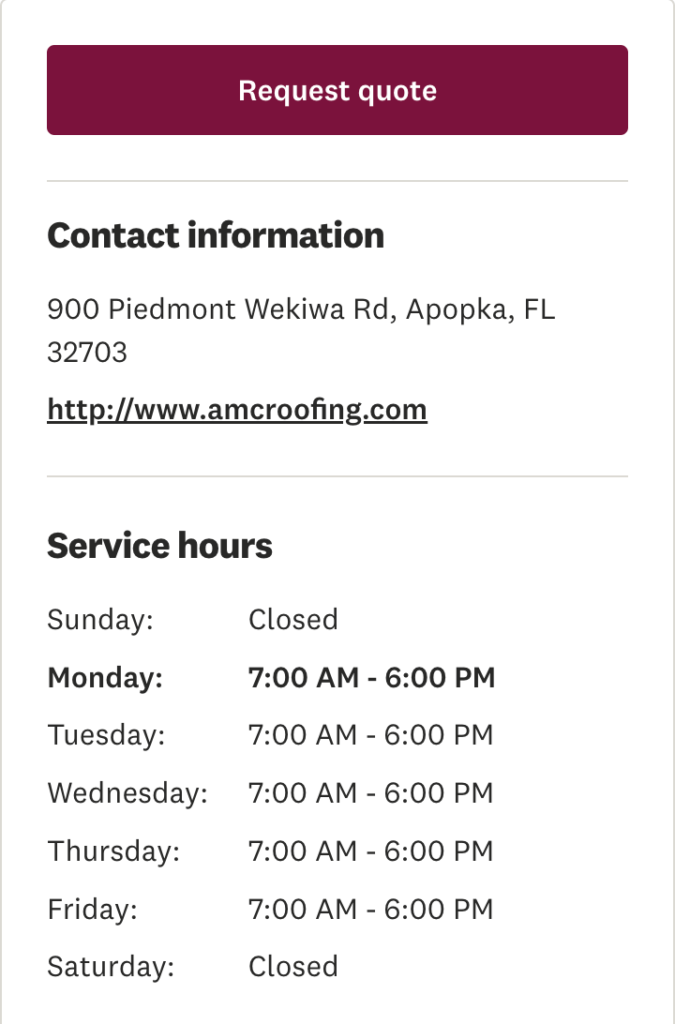
E-A-A-T for Roofing Websites
Depending on who you ask, E-E-A-T is either the most prominent Google ranking factor or not a ranking factor at all.
Part of the discrepancy comes from Google’s own semantics.
They’ve publicly said that their Search Quality Raters are instructed to use E-E-A-T to determine the worthiness of a site’s ranking on search results.
For example, a rater evaluates a website currently ranking #2 for “roof repair frisco” to determine if it demonstrates expertise, experience, authoritativeness, and trustworthiness.
They might look for a detailed About Us page that lists the owner’s experience, badges for certifications, licenses, and awards, or original and unique images from recent jobs.
Google then collects the rater’s findings and combines them with large-scale findings from other raters to determine the efficacy of its own algorithm.
When the results misalign with Google’s standards, they use the rater’s information to tweak the algorithm in hopes of producing superior results.
So when Google recently said that “E-E-A-T is not a ranking factor,” they are merely speaking technically.
The name of the actual ranking factor (or series of ranking factors) that prioritizes websites demonstrating experience, expertise, authoritativeness, and trustworthiness is not public.
About Us Page
I recommend detailing your experience and expertise on your company’s About Us page.
Publish an original photo of the company owner and outline their history and skillset.
Publishing additional sections within the About Us page for high-level staff whose experience and expertise add credibility to your business is also helpful.
Badges and Awards
I recommend displaying badges and awards for your company’s achievements.
This can include certifications like GAF’s Master Elite Certification or awards like Brava’s Spanish Barrell Tile Roof Excellence Award.

Social Proof
I recommend showcasing reviews and recent jobs that serve as social proof.
Social proof is a critical component of E-E-A-T, particularly the authoritativeness and trustworthiness component.
My clients get an embedded reviews slider on their websites, which shows customer feedback from Google reviewers.
They also get a “pins” page that connects to their DataPins app and publishes recent jobs, including photos, mini-maps, geo-locations, and schema markup.
Final Thoughts on Local SEO Marketing for Roofers
Roofing Webmasters has launched thousands of local roofing campaigns over the past fourteen years, and our data helps illustrate techniques and strategies that drive results for local roofing companies.
Google is constantly changing its algorithm for both organic and map-pack results, and companies that lag behind will suffer the consequences of lower rankings and fewer leads.
However, roofing contractors that consistently invest in modern local SEO strategies will reap the rewards with increased visibility, higher click-through rates, and more customers.
Our company devotes research, development, and testing to local SEO campaigns, as evidenced by our creation of the DataPins software. We look forward to continuing to help roofing companies maximize their local SEO.




